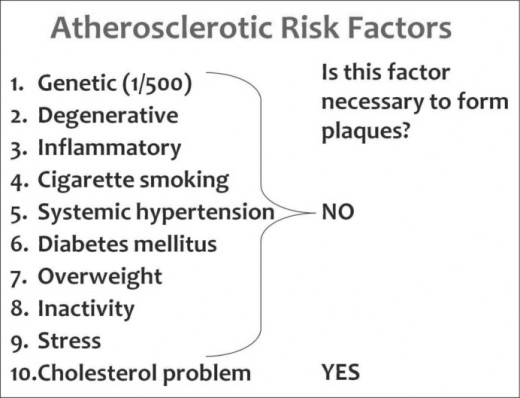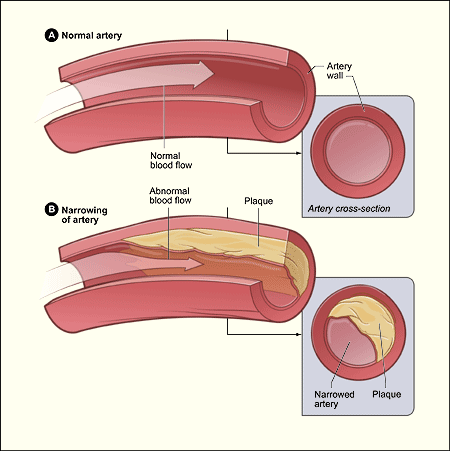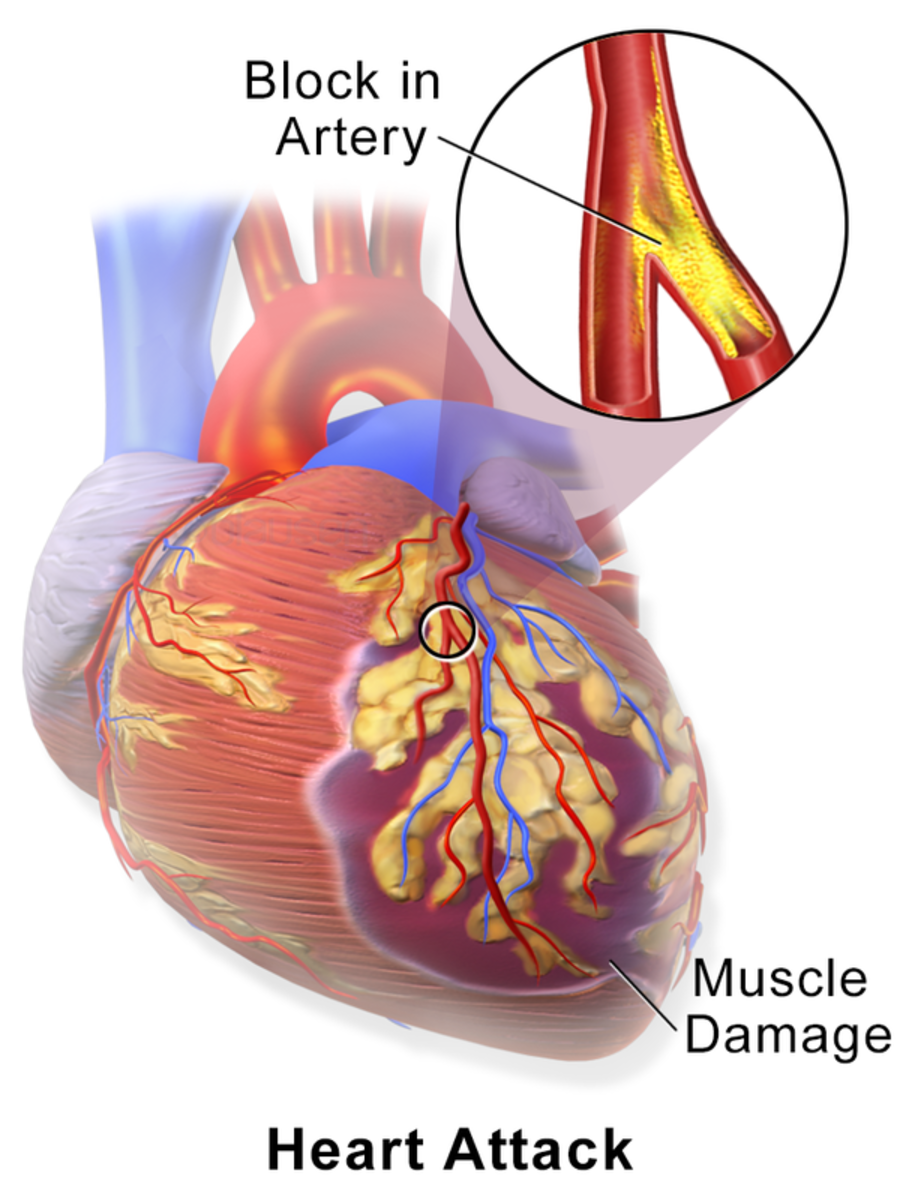Cholesterol and 8 Other Causes of Heart Attacks
Causes or Risk Factors of Heart Attacks


10 Causes or Risk Factors of Heart Attacks including cholesterol
The picture on the right has the 10 atherosclerotic risk factors or causes of heart attacks. The National Heart, Lung and Blood Institute says:
Atherosclerosis (ath-er-o-skler-O-sis) is a disease in which plaque (plak) builds up inside your arteries. Arteries are blood vessels that carry oxygen-rich blood to your heart and other parts of your body.
Plaque is made up of fat, cholesterol, calcium, and other substances found in the blood. Over time, plaque hardens and narrows your arteries. This limits the flow of oxygen-rich blood to your organs and other parts of your body.
Atherosclerosis can lead to serious problems, including heart attack, stroke, or even death.
Please note that heart attacks are the number one cause of death in the United States. The second cause of death in the U.S. is cancer. The third cause of death in the United States are strokes but most strokes cause someone to become disabled.
Most of this information comes from Michael Greger, M.D. who is an author, physician and internationally recognized professional speaker on a number of important public health issues. He owns the NutritionFacts.org website and has many very short videos on the internet and a few long ones.
The title of this article is referring to the 9 modifiable risk factors. In the picture you see that one of the 10 risk factors is genetic and that cannot be modified. But that is a very miner one. The others are degenerative, inflammatory, cigarette smoking, systemic hypertension (high blood pressure), diabetes mellitus, overweight, inactivity (lack of exercise), stress and cholesterol problem.
Dr. Greger substitutes 2 of the above (degenerative and inflammatory) for abdominal obesity and lack of eating fruits and vegetables (since they are anti-inflammatory) on the video below. Now he explains why cholesterol is the main one while the others are contributory to it.
Here is an article by PubMed Central (PMC) that is part of the U.S. National Library of Medicine. This 2013 article is called Facts and principles learned at the 39th Annual Williamsburg Conference on Heart Disease. It says:
Although the Framingham investigators and others have convinced most physicians and the lay public that atherosclerosis is a multifactorial disease, Roberts [William C. Roberts, M.D., Executive Director, Baylor Heart and Vascular Institute] is convinced that the disease has a single cause, namely cholesterol, and that the other so-called atherosclerotic risk factors are only contributory at most.
There are in Roberts’ opinion 4 facts supporting the contention that atherosclerosis is a cholesterol problem: 1) Atherosclerosis is easily produced experimentally in herbivores (monkeys, rabbits) by giving them diets containing large quantities of cholesterol (egg yolks) or saturated fat (animal fat). Indeed, atherosclerosis is one of the easiest diseases to produce experimentally, but the recipient must be an herbivore. It is not possible to produce atherosclerosis in carnivores (tigers, lions, dogs, etc.). In contrast, it is not possible to produce atherosclerosis simply by raising a rabbit's blood pressure or blowing cigarette smoke in its face for an entire lifetime.
The above is on the first fact. You can go to the article to see the other 3. The above says that carnivores, that are animals that eat animals, do not get clogged arteries so it does not matter if they eat meat. Humans can get clogged arteries just like the animals that eat plant foods (herbivores). The only way that they can cause these animals to get clogged arteries is by giving them food to eat that contains cholesterol or saturated fat. It says that saturated fat is animal fat but there is some saturated fat in plant foods but not nearly as much as in animal foods.
Now they are not giving a theory on why cholesterol and saturated fat in foods cause clogging of the arteries. They know from studies that people who floss their teeth get less heart attacks but they do not know why. Although it could have something to do with the bacteria that grow on teeth or that flossing reduces tooth decay that can get to the root where bacteria enters the body. But you do not need to know why to get this benefit of flossing teeth.
In cholesterol there is low density lipoprotein (LDL) and high density lipoprotein (HDL). The LDL is considered bad for health while the HDL is considered good for health since it is the cholesterol being taken out of the arteries. The doctors or medical establishment consider a 130 mg/dl count of LDL to be normal and a count of 100 to be ideal or optimum. But many people with optimum levels of LDL get heart attacks and strokes. So they say that cholesterol is not really an issue.
This is similar to the amount of vitamin D that people take. Many people take amounts of it that they or their doctors consider to be enough but they are not enough to protect them from cardiovascular problems, obesity, arthritis, diabetes, autism, the flu, cancer and many other things. Moores Cancer Center proposes that cancer is a vitamin D deficiency. Michael Holick Ph.D, M.D. says that there is a vitamin D deficiency pandemic (widespread epidemic).
I was talking to one woman that had cancer and her doctor had her taking 1,000 IU of vitamin D a day. Also they found that vitamin D can make a big difference in helping MS (multiple sclerosis). I was talking to a woman that was limping because of MS and she was taking 1,000 IU of vitamin D daily. So what is wrong with that. First would you agree that an adult that weighs over 100 pounds needs more nutrients than a baby that weighs 20 pounds?
They did a study in Finland in the 1960s where they gave the suggested amount of 2,000 IU of vitamin D daily to over 10,000 babies for the first year of their life. What happened? Did they all die? No, it reduced type 1 diabetes by 80%. Now if they would have used only 1,000 IU a day then maybe it may have only reduced it by 30% but we do not know.
This article, How Much Vitamin D Should You Take, links to an article by JAMA (Journal of the American Medical Association) that says that 77% of Americans have a vitamin D deficiency. This includes 90% of blacks and 97% of Mexican-Americans. So see this article in case you or someone that you know is not one of the 23% of Americans that do get enough vitamin D! It also has a link to Mayo clinic that explains that if you take 30,000 IU daily for months that you can get too much vitamin D. You cannot get too much vitamin D from sunlight.
How to Actually Prevent Heart Attacks
So above I left off where I said that the optimum amount of bad cholesterol (LDL) is a count of 100 yet many still get heart attacks with that amount. So this is just like many taking what they or their doctor thinks is optimum amounts of vitamin D yet getting many problems from a vitamin D deficiency.
So maybe a count of 100 mg/dl of LDL is still too high. Cardiology has to do with the heart. Here is the Journal of the American College of Cardiology (JACC). Volume 43, Issue 11, June 2004 called Optimal low-density lipoprotein is 50 to 70 mg/dl. It says:
The normal low-density lipoprotein (LDL) cholesterol range is 50 to 70 mg/dl for native hunter-gatherers, healthy human neonates, free-living primates, and other wild mammals (all of whom do not develop atherosclerosis).
So this is saying that people that have below 70 mg/dl of LDL cholesterol do not get heart attacks. So next time you go to a restaurant, tell them the above is what you want. Now they cannot give this to you so how do you get it? Now we need to go to PubMed that is different than PubMed Central but both are part of the U.S. National Library of Medicine.
So here is their article called Vegetarian Diet and Cholesterol and Triglyceride Levels. Please note that triglycerides are also bad for you. Note that the following talks about TG that is total cholesterol where they add the good and bad cholesterol together and TG is the triglycerides. It says:
Blood samples were collected from 76 individuals--both males and females--separated in four different diet groups: omnivores, lacto-ovo vegetarians, lacto vegetarians, and restricted vegetarians (or vegans). Dosing was done for: TC, LDL, HDL and TG.
Higher levels were reported by omnivores, with decreased levels for vegetarians as animal products were restricted, with lowest levels having been reported by vegans. Mean and standard deviation for TC were 208.09 +/- 49.09 mg/dl in the group of omnivores, and 141.06 +/- 30.56 mg/dl in the group of vegans (p < 0.001). LDL values for omnivores and vegans were respectively: 123.43 +/- 42.67 mg/dl and 69.28 +/- 29.53 mg/dl (p < 0.001).
You can read this very short article to see that TG levels were lower for vegans. So for meat eaters the LDL was 123 and for vegans it was 69. Also using advanced calculus you can see that 69 is lower than 70 unless I made an error in calculations.
In the upper right hand corner of that article it has a link that says Full Text Links. If you click on that you get more thorough details. It says that the LDL for omnivores (meat-eaters) are 208, but we already know that. It also says that the LDL levels for the lacto-ovo vegetarians is 101.47 (+ or - 28.47). Lacto-ovo vegetarians eat dairy like cheese and milk and also eggs.
Lacto vegetarians (no eggs but dairy) have an LDL of 87.71 (+ or - 41.67). The chart also lists the triglycerides also. And you already know that the vegans or veganese, as I like to call them, have an LDL level of 69. So if you live in the U.S. and pay taxes then most of the above research was paid for by you. Thanks for your support and thanks for reading this with hopefully an open mind.
Also there is a book called The Cholesterol Wars: The Skeptics vs the Preponderance of Evidence by Daniel Steinberg. It says:
As discussed in Chapter 3, it was not appreciated that the average blood cholesterol level in the United States, the so-called normal level, was actually abnormal. It was accelerating atherogeneis [formation of lesions or deposits on the inner wall of arteries] and putting a large fraction of the so-called normal population at a high risk of coronary heart disease [A disease of the heart and the coronary arteries that is characterized by atherosclerotic arterial deposits that block blood flow to the heart, causing myocardial infarction (heart attack)].
So if you want to sound like a doctor call a heart attack a myocardial infarction and call a stroke a cerebrovascular accident and call cancer malignant neoplasm. Two of my friends died of malignant neoplasm recently.
Important Note on Plant-Based Diet
A vegan diet comes with a belief that if you ever eat any animal food you will be damned to hell for eternity. So this is promoting a plant-based diet. So the idea is that even if you cannot stop eating animal foods you can still benefit greatly by reducing the amount of animal foods that you do eat. This is what Dr. Oz does. See Dr. Oz Promotes a Raw Plant-Based Diet. This has a video where he puts 3 women into a zoo and they only eat raw plant-based foods. He measures changes in blood lipids (cholesterol and triglycerides) before and after 2 days and the changes are miraculous!
Extremely Important
I already talked about vitamin D deficiency that contributes to heart attacks. Dr. Greger says that many vegans die well before they should due to a lack of vitamin B-12 and omega-3 essential fatty acids. So it is important for vegans to get enough of these. For more on this see The Essential Supplements.









